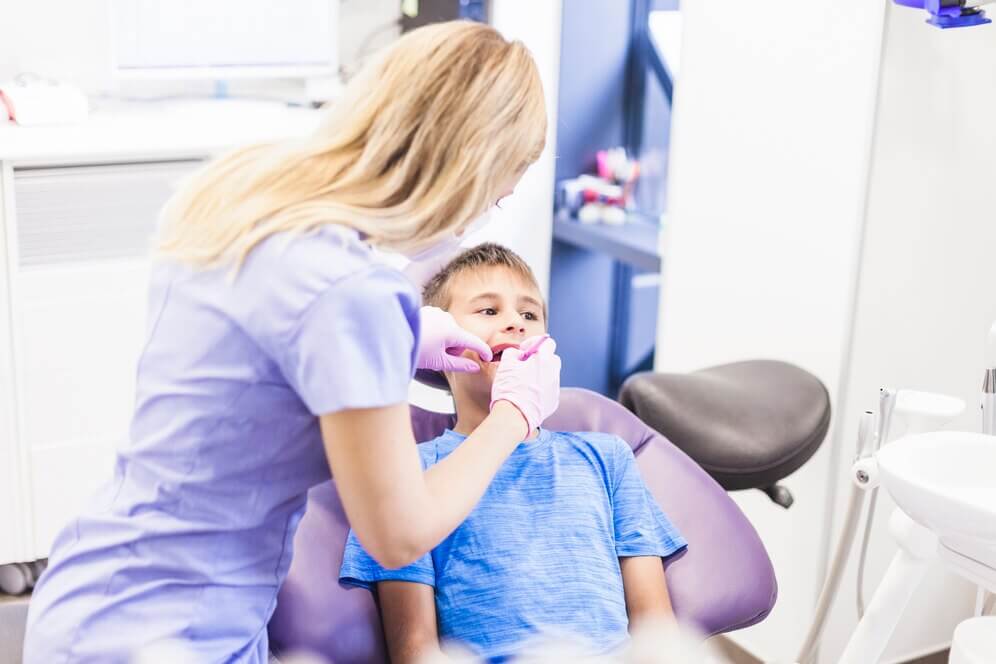It is never too early to consult a dentist. Your child needs to see a dentist as soon as the first tooth appears, or he or she turns one, whichever is earlier. This is important because prevention of decay and other potential oral problems need to be addressed at this time to ensure optimal oral health as your little one develops and grows. Seeing a dentist at this time is also good because it helps your child become better accustomed to seeing a dentist for regular checkups. Also, the development of good habits (oral hygiene and dietary) needs to start early.
Many parents believe that since the first set of their child’s teeth is temporary, they don’t need to pay a lot of attention to them. However, dental problems can still arise. Cavities can develop, which may progress to infection and may lead to premature tooth loss.

As kids are dependent on their parents during their formative years, their oral hygiene becomes a parental responsibility. Here are a few things that you can do to ensure that your child’s gums and teeth remain healthy.
Baby teeth start to erupt through the gums between six and nine months of age, sometimes earlier. These milk teeth or first teeth help your child eat and speak and help the adult teeth come in straight. Even tiny teeth must be cleaned. Infants can get cavities, just like older children and adults. Following all feedings, you should clean your baby’s mouth and teeth. If the teeth are not large enough for an infant toothbrush, simply use a gauze piece or a wet facecloth to wipe teeth and gums. This prepares the baby early for what should become a lifelong habit.
Baby’s first visit to the dentist should occur by the age of one year, or when the first tooth appears.
Infants Can Get Cavities Just Like Older Children and Adults
Baby’s First Visit — Make it Fun!
Make an appointment for your child to see the dentist when the child turns one or when the first tooth appears, whichever is earlier. To prepare for the first visit:
This is a good time in your child’s life to build habits that will protect the teeth and lay the foundation for future health.

Around the ages of six to eight years, the first teeth start to fall out, and the permanent teeth erupt through the gums. By the age of 13, most of the permanent teeth, except for the wisdom teeth, should be in.
Permanent Teeth Will Not Be Replaced, So Remember:

Continuing good habits started in childhood is the best way for teens to keep their teeth and gums healthy. Whether wearing braces or orthodontic appliances, a teen needs to:
Some Issues You Should Be Aware of That Will Affect Your Oral Health:
EATING DISORDERS
GRILLS AND TOOTH JEWELS
SMOKING
WISDOM TEETH
Your dentist can tell whether your wisdom teeth have enough space or if they should be removed.
Your Checklist for Healthy Mouths
A healthy lunch and snack should definitely be part of your child’s regular eating habits.
A good nutrition program for your child includes:
And here are some further links to help you learn more about nutrition and healthy eating:
Canada’s Food Guide to Healthy Eating
REDUCE YOUR CHILD’S SUGAR INTAKE
Tooth decay is caused by bacteria that feed on sugar from foods and produce acid that harms teeth. All foods and drinks, except water, can contribute to tooth decay in this way. Here are a few tips to cut down on sugar:
SMART SNACKING
Growing children and teens often need more than three meals a day. Smart snacking will ensure they have the energy they need to keep pace with their busy schedules.
Opening Hours
8 am Hygiene appointments available.
©2024 PAPE DENTAL GROUP| Copyright © 2023. Designed by CMC Marketing Agency. All Rights Reserved.